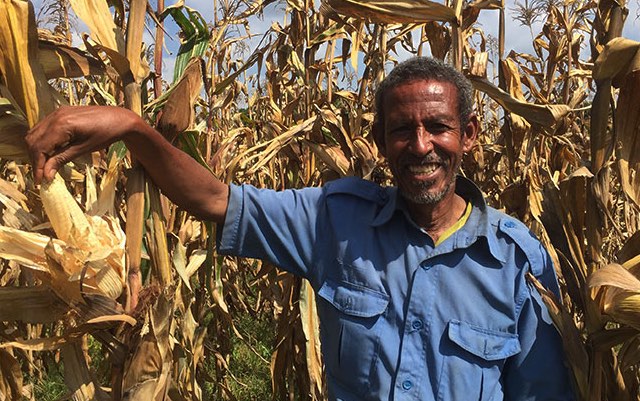For many researchers at IFPRI, the ultimate aim of our work is to convey findings to an audience that has a stake in the research and is in a position to act on our recommendations. In July, our team had just such an opportunity in Ethiopia when we shared preliminary results from an evaluation of a video-mediated approach to providing agricultural extension services to farmers.
We presented our results to the state minister of agriculture, his director of extension, Addis Ababa’s very active research community, and representatives of several of the country’s development partners. This video-mediated approach to extension, pioneered by Digital Green in India, has already captured the imagination of the Ethiopian extension system at all levels. The Ministry of Agriculture and Livestock Resources partnered with Digital Green to introduce the approach in about 70 woredas (districts) across the country’s four main regional states. Given this initial scale of operation, there was a lot riding on our evaluation.
There are good reasons for the excitement around video-mediated extension, not least because the Digital Green approach is so unique. Its main attribute is front-end “hyper-localization,” where extension staff produce short videos that feature locally relevant content and local actors speaking in local languages. These videos are then screened for farmers by extension agents using low cost, USB-charged PICO projectors. The extension agent complements this with Q&As during and after the screenings. The entire operation is supported by back-end analytics to collect and break down screening attendance, information transmission, and other key variables required to monitor field operations and meet performance targets.
But does it work? That was the question everyone seemed to be asking. Our evaluation aimed to determine whether the video-mediated approach can increase farmers’ uptake of new agricultural practices and technologies.
We explored this question across three main crops (teff, wheat, and maize) and three practices (row planting, lower seeding rates, and urea side dressing) with a randomized controlled trial conducted in four of Ethiopia’s regional states during the country’s main agricultural season in 2017. Videos were screened for farmers in villages assigned to the treatment group while farmers in control villages received information on the same crops and practices via the standard extension approach, but without video. While not all farmers in the treatment groups actually attended the video screenings—field logistics can be challenging in a new program operating at this scale—we nonetheless found measurable effects of the video-mediated approach.
Our preliminary results show that living in an area where local extension agents used the video-mediated approach resulted in a 6 to 8 percentage point increase in uptake, with the actual increases varying by crop and practice. These increases translate into 22 to 36 percent increases in uptake relative to the mean uptake rate in areas where the video-mediated approach was not used (i.e., where farmers received conventional extension services).
By most measures, these preliminary results are quite respectable—high uptake rates after just one season of exposure to the video-mediated approach suggests that there are real effects in play, even with the typical teething pains in the rollout. These findings are also policy-relevant because they estimate what might occur if and when the government expands this approach further.
But in a world where governments, donors, and development practitioners expect large and immediate results, we faced some challenges in conveying our preliminary results. Our audiences initially expressed some disappointment—they were so enthusiastic about the video approach that their expectations far exceeded even the already positive range of uptake rates that we found.
At the end of the day, by walking through our evaluation design and results slowly and carefully, we convinced our audiences that these were, indeed, respectable uptake rates. And we saw sure signs of interest from the government of Ethiopia in expanding this video-mediated approach.
What’s next? There is a lot of exciting work in the pipeline as Digital Green, the Ministry of Agriculture and Livestock Resources, and the regional bureaus of agriculture figure out how to expand the rollout of video-based extension. That means new tools and content for thousands of hard-working extension agents who live and work in rural Ethiopia, and new knowledge and opportunities for Ethiopia’s farmers.
And for us researchers, it also means another year of data collection, analysis, and presentation to some very tough audiences—work that we look forward to eagerly.
David J. Spielman is a Senior Research Fellow with IFPRI’s Environment and Production Technology Division (EPTD). Simrin Makhija is an EPTD Research Analyst. Gashaw T. Abate is a Research Analyst with IFPRI’s Markets, Trade, and Institutions Division (MTID), based in Addis Ababa. Tanguy Bernard is an MTID Senior Research Fellow.







